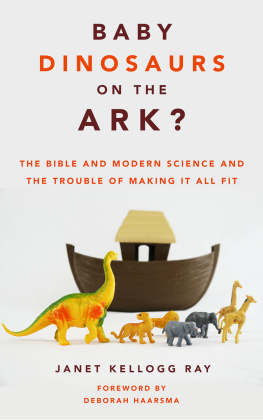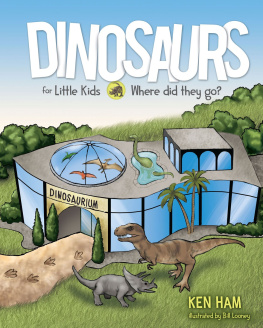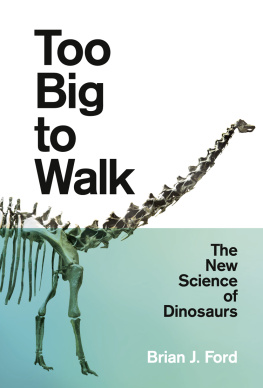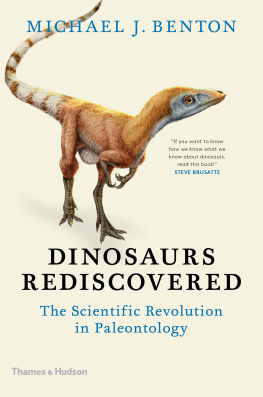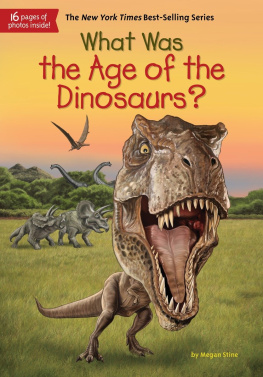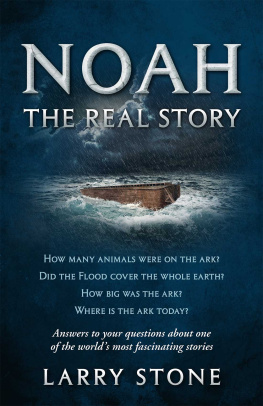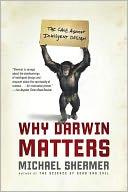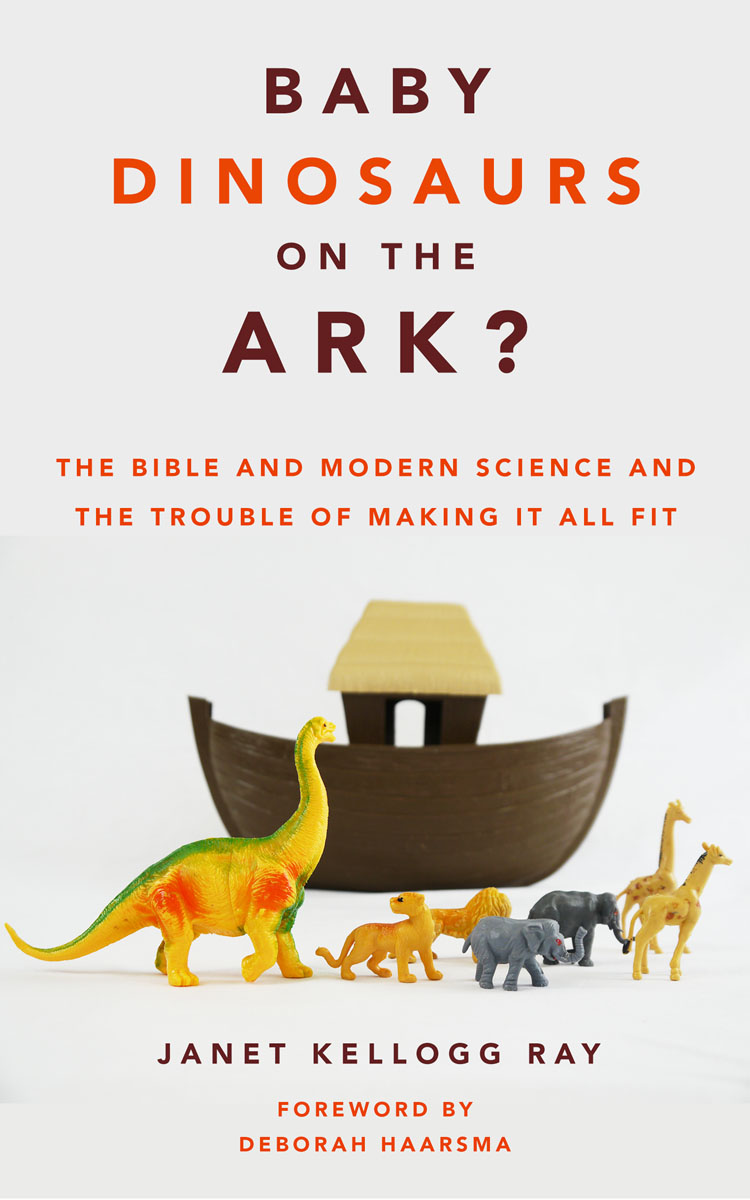
Janet Kellogg Ray combines transformative faith in God with a gritty commitment to science. Baby Dinosaurs on the Ark? opens new possibilities for bridge-building between the truth of faith and the facts of science. If you are tired of clumsy science and combative religion, Ray is the conversation partner you have been looking for! This book is for anyone who seeks truth wherever truth may be found.
Don McLaughlin
senior minister of North Atlanta Church of Christ
Its often unwise to judge a book by its title, yet this is the rare case when you should do just this. Baby Dinosaurs on the Ark? is an intriguing title completely backed up with an even more intriguing book. Janet Kellogg Ray blends storytelling, biology, and biblical reflection to offer a very helpful, engaging, and important book. All pastors, parents, and young adults will find this book an essential resource in understanding faith and science and a way to faithfully embrace them both.
Andrew Root
author of Exploding Stars, Dead Dinosaurs, and Zombies: Youth Ministry in the Age of Science
My wife, like Janet Kellogg Ray, is a science teacher. Her students and colleagues know she is married to a pastor. Each year, like clockwork, a student or fellow teacher asks her about the intersection of science and faith. Their assumption is that her allegiances lie with either faith or science, that she couldnt hold them both appropriately. Science and faith are in a dance together, and Janet Kellogg Rays Baby Dinosaurs on the Ark? helps those of us with questions about the interplay of faith and science articulate and understand our faith better. Here you will discover more of what God is up to in the world, how faith and science testify to one another, and even more so how they testify the beauty of our Creator.
Sean Palmer
author of Unarmed Empire: In Search of Beloved Community
Ray writes with candid humor, a pastoral spirit, and engaging, accessible science. This book deserves to be widely read, especially if youre not sure that evolution and robust faith can go together.
Dennis R. Venema
professor of biology at Trinity Western University
What a delight to read! With an engaging style and a keen mind, Ray navigates the landscape between the false binary that so many Christians face: reject science or reject God. A trustworthy guide, Ray explores the various positions with intellectual honesty and civility; rare is the author who can explain this complex topic in such a clear and compelling way. If you are looking for a resource that equips you both to embrace the findings of science and to embody a deep faith, this is the book for you.
Ken Cukrowski
dean of the College of Biblical Studies at Abilene Christian University
Too much Christian opinion on science has been uninformed and unhelpful. In Baby Dinosaurs on the Ark? Dr. Ray gives us a down-to-earth yet thorough introduction for how science works and how necessary it is to shake off unhelpful and untrue assumptions about the Bible. If anyone asks why you accept the science of evolution as a Christian, feel free to simply pass them a copy of this book.
Jared Byas
cohost of the podcast The Bible for Normal People
This is the most cleverly written and yet profound book Ive read in some time. I love it! Ray makes complex and deep issues accessible. She answers questions about science and contemporary debates. I plan to give copies to friends trying to make sense of evolution and Christian faith.
Thomas Jay Oord
author of The Uncontrolling Love of God
Wm. B. Eerdmans Publishing Co.
4035 Park East Court SE, Grand Rapids, Michigan 49546
www.eerdmans.com
2021 Janet Kellogg Ray
All rights reserved
Published 2021
Printed in the United States of America
27 26 25 24 23 22 21 1 2 3 4 5 6 7
ISBN 978-0-8028-7944-8
Library of Congress Cataloging-in-Publication Data
Names: Ray, Janet Kellogg, 1960 author.
Title: Baby dinosaurs on the ark? : the Bible and modern science and the trouble of making it all fit / Janet Kellogg Ray.
Description: Grand Rapids, Michigan : Wm. B. Eerdmans Publishing Co., [2021] | Includes bibliographical references and index. | Summary: An exploration of creationism and the science of origins that shows how a literal reading of the Bibleparticularly the book of Genesiscan lead to distortions of scientific realityProvided by publisher.
Identifiers: LCCN 2021010006 | ISBN 9780802879448
Subjects: LCSH: Bible and science. | BibleCriticism, interpretation, etc. | Creationism. | Bible and evolution.
Classification: LCC BS650 .R39 2021 | DDC 261.5/5dc23
LC record available at https://lccn.loc.gov/2021010006
To Mark,
for believing that I have something worth saying
Contents
Foreword
Can the Bible and science work together? Perhaps you have been told no. Maybe your science professor said that you cant be a scientist and believe the Bible. Maybe your church preached that you must defend your faith against science. Maybe you heard both at once! Unfortunately, that no has become more shrill as polarization grows. Increasingly, people define their own identity by their disagreement with the other side, making it hard to see any value or agreement with others. Misinformation on science abounds. Social media pulls us further apart.
The no has driven countless people away from God. Secular scientists have only to hear about baby dinosaurs on a boat with humans to decide that they cant take Christianity seriously. And Christians have only to hear scientists openly mock their faith to decide that science is against them, such as in 2019 when Neil DeGrasse Tyson tweeted on December 25, On this day long ago, a child was born who, by age 30, would transform the world. Happy Birthday Isaac Newton. The next generation is hearing the no loud and clear. In 2018, half of churchgoing teenagers agreed that the church seems to reject much of what science tells us about the world (Gen Z: The Culture, Beliefs and Motivations Shapingthe Next Generation [Barna, 2018]). With the many news stories in 2020 of evangelicals skeptical about public health science on Covid-19, I expect that percentage has only grown. Unfortunately, the polarization has eternal consequencesissues of science are among the main reasons young people are leaving the church (David Kinnaman, You Lost Me [Grand Rapids: Baker Books, 2016]).
For me, and for author Janet Kellogg Ray, the answer once was no, but today is yes. I grew up in an evangelical church, learning the Bible from cover to cover and growing in my commitment to Christ. At our church we believed the earth was young, because the only alternative was an atheistic version of evolution and the big bang. Evolution was definitely a bad word. Yet I loved science, and the same church encouraged me to pursue it. When I had questions in high school about evolution, it helped immensely that my parents didnt tell me the nothey actually came alongside me in my confusion and said I dont know. When I chose astronomy for my career, I finally took the time to dig into the issue. I was helped immensely when I discovered books by Christian astronomers, geologists, and biologistsfellow believers who explained the scientific evidence without an atheistic bias. They introduced me to biblical scholars and theologians who became the key for me to realize how I could say yes without denying the authority of the Bible. In fact, they led me to a richer understanding of Scripture and a deeper walk with God.
Next page
